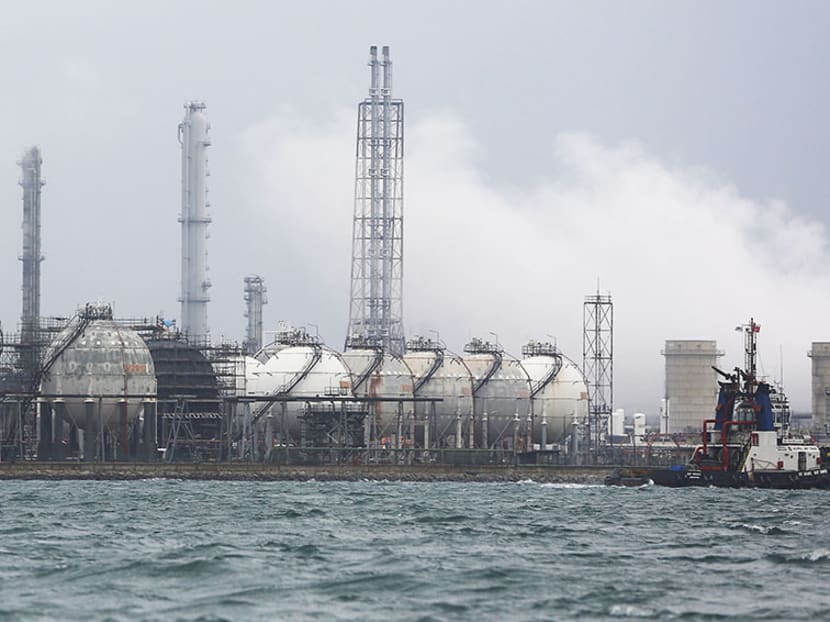Explainer: Crude oil price well down from its 14-year peak — will S'pore's pump prices follow suit?
SINGAPORE — After surging above US$130 (S$176) a barrel earlier this month to the highest level since 2008 as Russia's invasion of Ukraine escalated, crude oil prices fell back under US$100 a barrel in recent days before nudging a little higher again.

- Crude oil prices peaked at US$130 (S$176) a barrel in early March
- In recent days, the price fell below US$100 before rebounding to a little under US$110 a barrel on Friday (March 18)
- Despite this, petrol in Singapore is still around the S$3-a-litre mark
- Experts said the downward trend in crude oil reflects optimism over Russia-Ukraine peace talks, a possible revival of the Iran nuclear deal and other factors
- The price at the bowser does not necessarily correlate with crude oil price movements as other factors come into play, the experts said
SINGAPORE — After surging above US$130 (S$176) a barrel earlier this month to the highest level since 2008 as Russia's invasion of Ukraine escalated, crude oil prices fell back under US$100 in recent days before nudging a little higher again.
For motorists around the world, including Singapore, the war-driven run-up in crude oil has had a dramatic impact at the bowser, with petrol moving above the S$3 per litre mark here on some days.
But while the price of petrol here has dipped a little, it is yet to reflect the marked easing of crude oil prices, which were sitting just under US$110 a barrel for Brent crude on Friday (March 18).
According to Fuelkaki, as of March 17, 92-octane petrol was going for S$2.95 a litre on average, 95-octane S$2.99 and 98-octane S$3.46.
TODAY takes a closer look at why crude oil prices have fallen from their multi-year highs and why petrol prices have yet to follow suit.
WHY HAS CRUDE OIL FALLEN FROM ITS WAR-FUELLED HIGHS?
Experts who spoke to TODAY said some reasons for crude oil's price drop include the hope of peace talks in the Russia-Ukraine war, the resumption of Iranian nuclear deal talks and an easing of global demand for oil as economic activity slows.
CIMB economist Song Seng Woon said that aside from ongoing peace talks easing fears of the impact of the war, the resumption of talks around the 2015 Iranian nuclear deal has also increased confidence in crude oil supply.
The Iranian nuclear deal, if successful, may allow Iran to openly sell crude oil when the United States lifts its existing sanctions, increasing global supply of crude oil. This will help meet demand and reduce crude oil prices.
Former US President Donald Trump pulled out of the deal when he took office.
Mr Yaw Yan Chong, director of Refinitiv Oil Research, said another reason for prices to fall was the drop in demand for crude oil as China, the world's second largest economy, battles another wave of Covid-19 cases, putting cities into lockdown with its zero-tolerance policy and slowing down economic activity in the country.
However, he noted that assumptions about China's demand for oil reducing may be "exaggerated".
"The country has proven to be efficient in terms of managing the virus spread and keeping the duration of its lockdowns to a minimum of just days. We do not expect widespread demand destruction in China," he said.
Other experts said that crude oil prices may still rise further if the Russia-Ukraine conflict drags on.
Mr Heng Koon How, UOB head of markets strategy, said that existing sanctions and import bans on Russia, a major oil producer, will reduce crude oil supply, resulting in upward pressure on oil prices.
"This is part and parcel of the elevated volatility in the commodities space where many commodities face material supply disruptions," Mr Heng said, adding that the firm expects Brent crude oil to remain at US$110 a barrel in the months ahead, before dropping to US$100 by the end of the year.
But with such uncertainty in the global political and economic realms, Mr Song said it is hard to tell how prices will fluctuate.
"Just as quickly prices rose, and just as quickly prices dropped on anticipation of easing of tension, we really don't know. We are just pinning on hope that there will be some resolution to the Russian-Ukraine war," he said.
WHY HAVE PETROL PRICES FALLEN LESS THAN CRUDE OIL PRICES?
Despite the marked drop in crude oil prices from their original peak of US$130 a barrel, motorists are unhappy that petrol prices, which had surged to record levels in recent weeks, have not gone down as much.
When approached by TODAY, a spokesperson from ExxonMobil said that petrol prices are not just affected by the price of crude oil, but also other factors such as economic conditions, fuel production, inventory, storage and transportation costs.
"The retail prices of products are also influenced by other factors like marketing, storage, land prices, government taxes, currency exchange rates and competitive market forces," the spokesperson said, adding that the company has lowered petrol prices twice since March 14.
A spokesperson for another major oil company, Chevron, also said its pump prices are affected by a variety of factors, including "supply, demand, product costs, competition and the dynamics of the marketplace".
They said: "Chevron Singapore adjusts prices based on our own independent assessment and consideration of a number of factors, such as geopolitics, government taxes and duties, operating costs and land lease costs.
"We value our customers and firmly believe in offering our products at fair, reasonable and competitive prices."
A spokesperson from Shell also highlighted similar factors influencing the prices of fuel, such as the price of refined oil products based on the Means of Platts Singapore (MOPS).
MOPS is the pricing basis for refined products — such as crude oil — in Singapore, and is reported by price assessment agency Platts.
"While changes in prices cannot be attributed to any single factor, we have made several downward adjustments to our fuel prices since March 11, 2022, in view of recent oil price trends. We continue to monitor the situation and adjust our retail prices accordingly," said Shell's spokesperson.
Second Minister for Trade and Industry Tan See Leng said in Parliament on March 10 that competition watchdog Competition and Consumer Commission of Singapore will keep a close watch, investigate and take enforcement action if it finds anti-competitive behaviour such as a coordinated increase in petrol prices.
His statement was in response to Sembawang Group Representation Constituency Member of Parliament Lim Wee Kiak's question about what the Government is doing to prevent profiteering.
Dr Lim told TODAY that he filed the parliamentary questions as "many have felt the impact" of the rise in petrol and diesel prices. He added that he has filed another parliamentary question on this to ask the Government to look at more ways to help consumers including temporary lowering of petrol duty rates.
The Competition and Consumer Commission of Singapore told TODAY that between Feb 24 and March 23, it had received two complaints in relation to retail petrol price movements.
Meanwhile, the Consumers Association of Singapore said it had not received any complaints on higher pump prices or profiteering by oil companies from Feb 25 to March 17.
WHAT IS THE OUTLOOK FOR FUEL PUMP PRICES?
Mr Song said petrol companies are unlikely to adjust petrol prices for fear of crude oil prices picking up again.
"It boils down to confidence in seeing the price come down... they don't want to be in too much of a hurry (to adjust prices) as the situation is still evolving," he said.
Mr Yaw agreed, adding that he expects the volatility to last at least "one to two months" before prices stagnate at a higher range that is above pre-invasion prices.
Dr David Broadstock, a senior research fellow and the head of the Energy Economics Division at the National University of Singapore's Energy Studies Institute, said that the recent stall in the Ukraine conflict's peace negotiations is a reminder that it is too early for optimism.
"The uncertainty is clear and deep – there is contraction in global oil supply which will push prices up naturally," he said.
"Our best expectations would still not be able to provide a clear timeline for when things may truly ‘settle’, for want of a better term."













